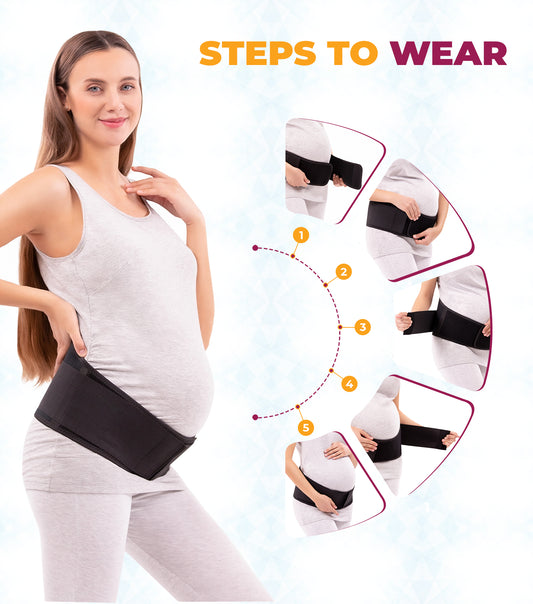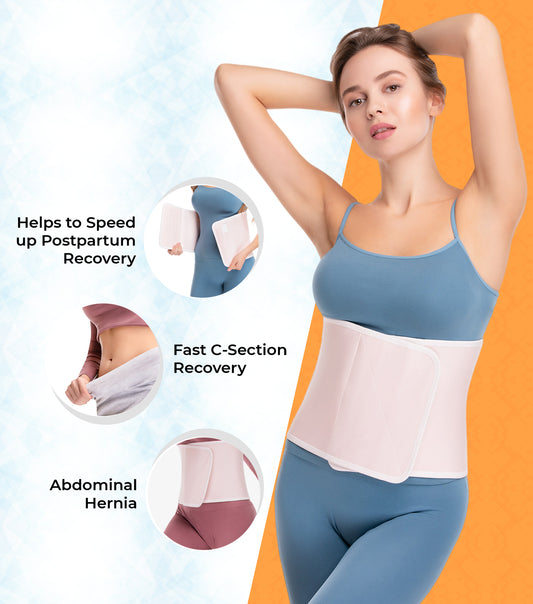

Featured Products
-
20-30 mmHg Compression Stockings Thigh-High, Closed Toe
Regular price $24.99Regular price Sale price $24.99Unit price -
15-20 mmHg Compression Stockings Thigh-high, Closed Toe
Regular price $24.99Regular price Sale price $24.99Unit price -
Anti-Embolism Stockings Thigh High, 15-20 mmHg, White
Regular price $16.99Regular price Sale price $16.99Unit price
Featured Products
-
Pregnancy Belly Band, SNUG360® Belly Support Band
Regular price $16.99Regular priceUnit price$19.99Sale price $16.99Sale -
Abdominal Binder & Wrap, SNUG360 Belly Binder
Regular price $19.99Regular price Sale price $19.99Unit price
As your child begins to develop, there's a lot going on inside. Here is additional information about what to expect, including a first-trimester to-do list.
You may not appear pregnant yet, but you're probably feeling it. Because a surge of pregnancy hormones is preparing your body to host your baby for the next nine months, you may experience a variety of aches and pains, including fatigue and flatulence.
While you may not be thrilled with some of these symptoms, try to keep in mind that they are part of an amazing process taking place within you: You are growing a child!
How many weeks is the initial trimester?
The first trimester spans weeks 1 through 13 of pregnancy, or approximately the first three months.
Uncertain of the week of your pregnancy? Calculating your due date is the initial step in organizing your current week. Keep in mind that your due date may change (especially if you experience irregular periods), so be flexible.
First trimester symptoms
In the first trimester, a great deal occurs for you. Among the most common early pregnancy symptoms, you may experience the following:
Morning nausea:
Unfortunately, it does not only occur in the morning, and it typically begins around the sixth week of pregnancy. Ginger tea or drops may be beneficial, as well as small, frequent meals. If it is severe, you may wish to discuss medications with your doctor to treat the symptoms of pregnancy-related nausea.
Such tender, tingling, and large breasts! By week 6, you may be wondering where your old breasts went.
Mood swings:
By week 7, you may (or may not) feel up, then down, then up again. If you have a history of depression or believe it may be more severe, discuss prenatal depression screening with your doctor.

Weight Gain (or lack thereof):
Your baby is still very small, so you only need to gain approximately three to four pounds during the first trimester. If you are experiencing a loss of appetite, you may lose a few pounds. Also acceptable, so long as your weight gain accelerates in the second and third trimesters. Focus for now on consuming frequent light meals of any high-nutrient-density foods (e.g., avocados, yoghurt, bananas, whole grain bread or crackers) whenever you can stomach them. Feeling particularly hungry? Attempt to restrict your caloric intake during pregnancy: During the first trimester, you do not require any additional calories (though your intake will go up in the second and third trimesters). If you end up gaining more weight than is advised, focus on getting back on track throughout the remainder of your pregnancy.
As your pregnancy progresses during this trimester, you may experience a variety of additional symptoms, including heartburn, constipation, metallic taste, food aversions, and headaches. The second trimester will provide much-needed relief!
Is it normal to experience cramping during the first trimester?
Yes, cramping and stomach pain are common during the first trimester. During the implantation phase of early pregnancy, when the embryo attaches to the uterus, light bleeding or mild cramping may occur.
Gas and bloating, two common causes of cramping, occur frequently during the first trimester of pregnancy. In addition, as your body transfers more blood to the uterus, you may begin to feel pressure in this region of the body, particularly after an orgasmic experience (during which you have normal uterine contractions).
Given all the changes occurring in your body during pregnancy, it's natural to wonder what is normal and what isn't. In many instances, an occasional twinge is not cause for alarm. However, it is also essential to realise that the risk of miscarriage is greatest during the first trimester.
Here are some symptoms that always require a visit to the doctor:
- Heavy vaginal bleeding
- Extreme abdominal distress
- Acute thirst
- Painful urination
- Fever greater than 101.5%, chills, and/or backache
- Extreme swelling of the hands and face
- Vision disturbances
How much does a baby grow during the first trimester of pregnancy?

During the first trimester, your unborn child develops from a single fertilised cell (a zygote). After implantation of the embryo in the uterine wall, fetal development accelerates, and the baby grows into a peach-sized bundle of limbs, organs, and body systems.
Here are some of the most significant events occurring in this exciting time.
By week 6, the baby begins to sprout arms, legs, hands, and feet; by week 10, fingers and toes appear.
Mane and digits:
Between weeks 5 and 8, the skin begins to form, while hair follicles and nail beds develop around week 11.
Digestive system:
By week 8, your baby's intestines will begin to form, and he or she will have gone through two sets of kidneys (with a third set on the way!).
Sensation of touch
Around week 8, your infant will develop touch receptors on the face (primarily on the lips and nose). By week 12, the genitals, palms, and soles of the feet will have developed receptors.
Eyesight:
In week 4, the optic nerves (which transmit information from the eyes to the brain and back) and lenses begin to form, while the retina begins to form in week 8.
Heart:
By week 5, the tube that will become the heart of your unborn child begins to beat spontaneously. It will become stronger and more regular, and you will be able to hear it, around the ninth or tenth week of pregnancy (or later, depending on the position of your uterus).
Brain:
In approximately the eighth week of pregnancy, your baby's brain will begin to move those developing limbs.
Sense of taste:
By week 8, your infant will have taste buds that are connected to the brain. However, because the taste pores are still developing, the baby will not be able to taste the amniotic fluid surrounding it (which, by the way, tastes like your most recent meal).
Other significant first trimester developments include the formation of muscles, the production of white blood cells to fight off pathogens, and the formation of the vocal cords.
What nutrients are needed during the first trimester of pregnancy?
Throughout the next nine months, you should strive to consume the essential nutrients for pregnancy, but in the first trimester, you should pay special attention to:
Folic acid

This is the most important micronutrient for nutrition during the first trimester and prenatal nutrition in general. Folic acid (also referred to as vitamin B9 or folate in food form) plays a crucial role in preventing neural tube defects. Take a daily prenatal vitamin and consume oranges, strawberries, green leafy vegetables, fortified breakfast cereals, kidney beans, nuts, cauliflower, and beets to meet the daily recommendation of 600 micrograms.
Protein
It is essential for muscle development in both you and your baby, and it promotes the growth of uterine tissue. Aim for approximately 75 grammes daily. Eggs, Greek yoghurt, and chicken are all excellent sources.
Calcium
It is essential for the development of your baby's teeth and bones. Too little calcium in your diet can result in osteoporosis (brittle bones) in the future, as your growing baby will draw calcium from your own stores. Ask your OB/GYN if you should take a supplement if you're concerned you're not getting the daily recommended amount of 1,000 milligrammes from a balanced diet that includes milk, cheese, yoghurt, and dark leafy greens.
Iron
As your blood supply increases to meet the needs of a growing baby, iron becomes increasingly essential. To reduce the risk of developing anaemia during pregnancy, it can be difficult to consume 27 milligrammes of iron per day from food alone. Therefore, it is important to take a prenatal vitamin that contains a sufficient amount of iron. Include protein sources such as beef, chicken, eggs, tofu, and spinach in your diet.
Vitamin C
Oranges, broccoli, and strawberries are C-rich foods that promote bone and tissue development and iron absorption in infants. You should strive for 85 mg per day.
Best foods for the first trimester of pregnancy

The following foods are recommended by nutrition experts because they are rich in the vitamins, minerals, and macronutrients your body (and your baby's developing body) needs to thrive.
Lean beef
Lean meats, such as sirloin or chuck steak, pork tenderloin, turkey, and chicken, offer all of the amino acids that serve as the building blocks for cells and are a good source of iron and protein.
Yogurt
Each cup's calcium and protein contribute to bone health. Choose a variety with a short list of ingredients and minimal added sugars.
Edamame. These soybean pods are rich in plant-based protein, as well as calcium, iron, and folate.
Kale
This dark leafy green provides a combination of essential nutrients, including fibre, calcium, folate, iron, vitamins A, C, E, and K.
Bananas. Bananas are one of the best dietary sources of potassium and are bland enough to be consumed by those with a sensitive stomach.
Avoiding these during the first trimester
You have an extensive list of things to do now that you are pregnant, but there are also a few things you should avoid doing. Here are some things to avoid during the first trimester.
Hot tubs and saunas
Any activity that can raise your core body temperature above 101 degrees Fahrenheit, such as hot tubs, saunas, or even a luxurious bath, should be avoided once you become pregnant. (The same holds true for Bikram or "hot" yoga, as well as outdoor exercise in sweltering temperatures.) You don't have to take cold showers, but you should bring a thermometer into the tub with you and keep the water between 97 and 98 degrees Fahrenheit.

Alcohol
Planning to celebrate your good news with a glass of champagne? Think again. No amount of alcohol during pregnancy has been shown to be safe. Binge drinking, defined as four or more alcoholic beverages consumed in a single sitting, can result in complications such as foetal alcohol syndrome (FAS). Naturally, you can raise a glass, but make sure it contains a mocktail.
Uncooked foods
Now that you are pregnant, you must avoid sushi and medium-rare steaks for the duration of your pregnancy. Meat, seafood, and eggs that are raw or undercooked can harbour bacteria and parasites that are harmful to you and your infant. The good news (if you can call it that) is that pregnancy symptoms such as nausea and food aversions may reduce your appetite, so you may not crave tuna tartare after all.
Cigarettes and marijuana use
Using tobacco products during pregnancy is unsafe. Smoking cigarettes and ingesting marijuana may increase the risk of pregnancy complications such as low birth weight and premature delivery.
Conclusion
The first trimester brings both welcome and unwelcome news (you're pregnant!) and symptoms (you can't keep down your breakfast). The good news is that the second trimester provides relief from morning sickness, fatigue, and the need to use the restroom every 15 minutes. Better times are just around the bend!










